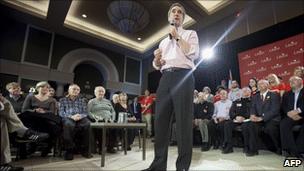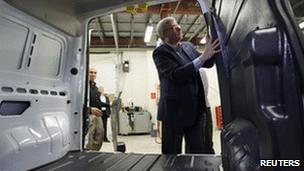Canadian PM Stephen Harper urges end to party subsidies
- Published

Michael Ignatieff said Mr Harper's plan would breed the problems that bedevilled US democracy
Canadian PM Stephen Harper has vowed to end subsidies to Canada's political parties if his Conservative party decisively wins the 2 May election.
Opposition Liberal Party leader Michael Ignatieff denounced the plan as American-style "big money" politics.
Recent polling shows the Conservatives could win the election and even take a majority of seats in parliament.
The poll was triggered last week when parliament approved a no-confidence vote called by the Liberal Party.
"Taxpayers shouldn't have to support political parties that they don't support," Mr Harper told reporters in Moncton, in the province of New Brunswick.
The prime minister, who has led the minority Conservative government since the party won the 2006 federal elections, described the subsidy as "this enormous cheque that keeps piling into political parties every month, whether they've raised any money or not".
'Full war chests'
The programme, established in 2004 by the Liberal government of Jean Chretien, gives each party an annual public subsidy of 2 Canadian dollars ($2.07; £1.29) per vote received in the last election held.
Mr Harper said the subsidy allowed for tiresomely frequent elections because "the war chests are always full". The 2 May election will be the country's fourth in seven years.
The end of the subsidy would have the greatest impact on Canada's opposition parties, which are less adept at grassroots fundraising than the Conservatives.
Corporate and union donations are banned in Canadian politics, and the opposition parties have become dependent on the public subsidies for their operations.
Mr Harper's bid in 2008 to end the subsidies provoked an effort by the opposition parties - Liberals and New Democrats, backed by the Bloc Quebecois - to topple his government.

Mr Harper, shown at a car shop in Dieppe, sought to end the public subsidies in 2008
His government was saved only when parliament was suspended.
Campaigning in London, Ontario, Mr Ignatieff, an author and political commentator, pledged Mr Harper would face united resistance from the opposition parties if he were to attempt to end the subsidies.
"We have a democratic system at the right price - it's economical, it creates a level playing field," he said.
"Do you defend Canadian democracy or do you want to import American-style democracy into this country? I don't think so, because you get big money, you get corruption, you get all the problems that bedevil American democracy."
Leaders of the third- and fourth-largest Canadian parties, Jack Layton of the New Democrats and Gilles Duceppe of the Bloc Quebecois, also denounced Mr Harper's proposal.
- Published27 March 2011
- Published25 March 2011
- Published25 March 2011
- Published24 March 2011
- Published24 March 2011